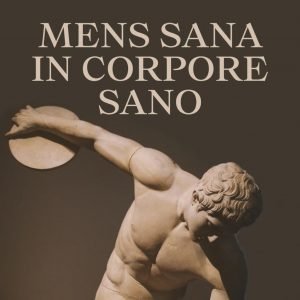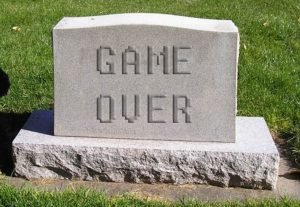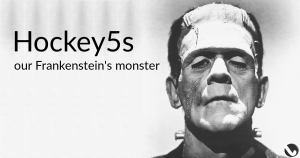Why we play hockey (or any sport) is a question that has many answers. It’s not only different because of where we live. Our “why” for playing hockey is different for many reasons. And for obvious reasons the different why’s also makes the “how we play hockey” is very different around the world.

TL;DR
We are getting near the end of hockey as we know it. The 11 v 11 game played on a field of 100 yards x 50 yards. Where you can only score from within the circle (or D). With unique elements like the penalty corner. Sure the game has known many changes throughout its history. Some with a major impact as well. The introduction of artificial grass. The abolition of the off-side rule. The introduction of the self-pass rule.
Next we’ll have to witness the transition to hockey5s. Unfortunately, sport is not the reason for this latest change. Politics, business and administrators protecting their job, are at the root of this change. That’s why this evolution does not feel right. IOC and our sports federation are selling out at the expense of our sport.
I’m not talking about wether you play hockey, ice hockey, indoor hockey, hockey5s, floorball, bandy, roller hockey, shinty, table hockey or… I kid you not… underwater hockey or unicycle hockey. But rather about the differences if you start playing hockey because it’s a way out of poverty. Because it’s a something they make you do at school or maybe a way for you to get a scholarship to get an education. Or because it’s a leisure activity you share with friends and family and a part of your education. Or because it’s a job that pays the bills. We can all imagine these different reasons for playing hockey make it difficult to manage the sport around the world in the same way.
Different “Why – How – What” for hockey
The golden circle is a marketing concept by Simon Sinek and it applies to a lot in life, not just marketing. If you’re not familiar with it watch this video. So think about your why for being involved in hockey… There is no denying the why we play sports or hockey is very different around the world.
In some parts of the world sports (and hockey) is something you do at school or as an extra-curricular school activity. And a organised sports structure for adults or seniors is hard to find. For some schools it’s a part of the educational curriculum. For others (where education also is a business) it’s a part of the PR machine needed to make money and attract new students and sponsors. So the reason for taking up hockey mainly is either because I have to, it’s a mandatory thing at my school. Or because it’s a way to get a scholarship so I can afford a (better) education. Neither reason is likely to to make hockey the sport of your choice for the rest of your life.
In other parts of the world sports (and hockey) is only considered to be a possible career. A way to secure a job at a company that uses sports as a PR tool. Or if you are lucky and determined enough to become a pro athlete at international level making enough money to support your family and have a better opportunity to land a job after your playing days. A system that will lead to deception in the sport for most and a career for few…
I will not try and explain the above reasons for playing hockey. Because they are too far away from the world I live in and understand. I can only try and explain the way we live sport as part of our life in my part of the world, which is western Europe. It’s not the only part of the world with this “why” for sport. There are other regions around the globe that have a similar approach and look at it from the same “why”.
Why play hockey – the original why…

I believe the why we have for playing hockey in my part of the world is the one that is closest to the original goal of sports as described back in the days by the Olympic movement. I know this sounds arrogant. But I have tried sincerely looking for the good (or better) in other setups for our sport, but was never convinced by them. Maybe that’s me and the way I was brought up to look at the world. I’m open for the debate and all other arguments, except for the easy way out in saying the way we do it, just would not work in other cultures or regions of the world. I believe that to be a fake argument from those not willing to consider change (and the hard work that comes with change).
Our “why” is based upon two elements we need to work on our entire life: health & education. From this why our “how” has evolved to family-centric clubs and our “what‘ has become the local/regional/national leagues in which we compete.
Parents with young children chose hockey. So they can join a hockey club as a place for their kids to meet and engage with family & friends and learn about working together as a team. But also to improve their own health & skills through perseverance and mainly lots of fun. It provides a physical activity in a healthy outdoor environment. Which stimulates working not only the body but also the mind. To achieve the “mens sana in corpore sano” ideal. Our clubs provide a healthy and safe environment for our kids to learn and practice in real life that what is taught at home and in school. When done right its makes them better people. These clubs are often an important part of the “village we need to raise our children“.
For university students and young adults joining a club – or continuing to play at their childhood club – provides a stable healthy environment to wind down from the efforts required by our studies or starting up work life. It provides a way to remain moving . And not get stuck behind a desk all the time and some different mental challenges to help clear the mind. Additionally it ‘s where we learn the art of networking. A skill that will serve us well in our professional lives later on. Often the bonds forged at our clubs at a young age remain strong when we encounter each other again in business or life later on.
For adults it’s not only a way to help educate our children. The club also provides in our own needs for staying healthy. Through practicing sports and never stop learning about ourselves (and others) through sports. Accepting and learning to deal with each others differences, strengths and weaknesses. Mens sana in corpore sano is something you should never stop working at.
The end of hockey
It has been over 3 years since I wrote a column “The end of hockey“. In it I address the lack of love for the game of hockey from the administrators running our sport. Or to say it less dramatically the problem of having other priorities instead of being 100% dedicated to hockey. My main concern… and the reason for predicting the end of hockey as we know it is that without the respect given to domestic hockey (in any shape or form based upon the customs in each region of the world), international hockey will have no future!
It triggered a response from the newly appointed CEO for the FIH, Thierry Weil, a former FIFA marketing director, in which he claims all of the money earned by FIH will go into development. However, the FIH made the choice to manage the Pro League themselves. Instead of outsourcing it to specialists who guaranteed a substantial income. Because of this the FIH has accumulated substantial financial losses these recent years. So development suffered.
That is, if you consider development to be growing the number of players playing the game. Because it’s clear to some it’s more (or only) about growing the number of fans and viewers rather than players. But even from that angle I doubt there has been much growth. The numbers from the “state of the game” survey done by FIH for the congress in 2021 want to prove something else. So we’ll wait for those numbers to be explained in detail by FIH. Which they said would be done after the summer of 2021 most likely. But I fear these will not be reliable nor relevant to what I believe should be the one and only objective for FIH. Growing the number of players playing hockey in a sustainable way. Anyway… we’ll wait & see and get back to you once these stats are released.
Hockey5s, our Frankenstein’s monster
Meanwhile the attention of FIH has shifted towards a new format they introduced in 2013: hockey5s. Or if you will: the solution to a problem that doesn’t exist… In January 2019 I wrote a column about the origin and the facts about hockey5s and why I believe it to be our Frankenstein’s monster. Very much parallel to the fictional character from book and movies, I’m convinced some of you will have grown to like the monster. As I’m sure the monster will do some good along the way. Though I fear, as in the story, in the end the monster will come back to destroy its creator. Meaning the push towards 5s will mean the Paris Games in 2024 could very well be the last games where our game of 11-a-side hockey will be played.
Administrators and those in charge of our sport claim they would like to see 5s introduced to the Games together with the traditional format of hockey. I believe this to be naive from some and a down right lie from others. LA 2028 will see our game of hockey being replaced by Frankenstein’s monster if we continue this way. Narinder Batra, recently re-elected as FIH president, was pretty unapologetic in stating his ambitions to get 5s to the Games. Quickly corrected for PR reasons by his CEO during the press conference following the FIH congress earlier this year. But who are we kidding here…
Sport is taken hostage by the IOC
Unfortunately the greatest vehicle to promote sport – the IOC – has been taken hostage by the people in sports administration. In order to protect their livelihood they sell out to sponsors and broadcasters who have turned sport into a mere PR tool for their brands. It has degraded our sport into an entertainment product. Product being the key word here. Because of this we see a lot of the sports authorities led by administrators who have lost touch with the original “why” but -understandably- are more concerned with their career and income opportunities.
It’s the reason why people like Mr. Batra, the current FIH president, is able to abuse our sport for his own political ambitions. Batra only cares about 1 thing. Bringing the Olympics to India and enjoying the political influence because of this for him in his home country. It’s the reason why he pushes a format like 5s, because that’s what the IOC likes: more medals using less resources. Giving the IOC what they want instead of looking after what would benefit the sport will get him closer to his own personal goal: power in India.
Is there room for professionalism and the business of entertainment in sport? Of course there is. In hockey also. But… and this is an important but… only if the people managing our sport, can show proof it is at the service of getting more people to play the game of hockey.
Looking forward to your comments below. I do not expect everybody to agree with me and am happy to engage in a polite and constructive discussion… 😉




